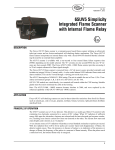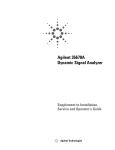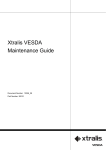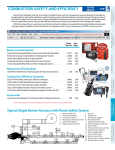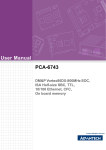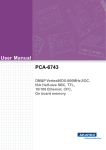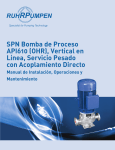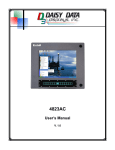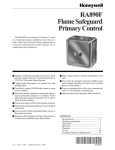Download Simplicity 953 Specifications
Transcript
® CU-104 JULY 7, 2009 65UV5 Simplicity Integrated Flame Scanner with Internal Flame Relay DESCRIPTION The Fireye 65UV5 flame scanner is a microprocessor based flame scanner utilizing an ultraviolet tube-type sensor and an electro-mechanical self-checking shutter mechanism. The Fireye 65UV5 flame scanner incorporates an internal flame relay with a fixed ON/OFF threshold thereby eliminating the need for an external flame amplifier. The 65UV5 scanner is available with a one-second or four second flame failure response time (FFRT) depending on the model selected. The “E” versions are one second FFRT, the non-”E”versions are four seconds FFRT. The Fireye 65UV5-1004, -1004E flame scanner provides an analog 4 to 20mA output referenced to flame signal strength. The Fireye 65UV5 flame scanner is powered from a 24 vdc power source provided externally and includes an integral 10-foot (3 meter) cable. A color-coded internal LED indicates flame status and alarm condition. This can be viewed through a viewing port on the rear cover. The 65UV5 housing has a NEMA 4X / IP66 rating. The unit is suitable for use in Class 1, Div. 2 hazardous environment groups A, B, C & D or Ex II3 G/D EExnA IIC T4A. 65UV5 CEX models are wired directly via a terminal rail located within the CEX housing. Suitable glands must be used to terminate the cable at the housing. The 65UV5-1000, -1000E scanners will become obsolete in 2008, to be replaced by the enhanced capability of the 65UV5-1004 and -1004E scanners. APPLICATION Fireye 65UV5 self-checking scanners are used to detect ultraviolet emissions from fossil fuel flames such as natural gas, coke oven gas, propane, methane, butane, kerosene, light petroleum distillates and diesel fuels. PRINCIPLE OF OPERATION The 65UV5 scanners use a UV-eye detector. This detector is a sealed, gas filled, UV-sensitive tube containing two electrodes connected to a source of DC voltage. When UV radiation of sufficient energy falls upon the electrodes, electrons are released and the inter-electrode gas becomes conductive, resulting in an electric current flow from one electrode to the other. The current flow starts and ends abruptly and is known as an “avalanche.” A very intense source of UV radiation will produce several hundred avalanches or pulses per second. With less radiation there will be fewer pulses per second. Upon total disappearance of flame, the detector output ceases. Thus, the presence or absence of pulses is an indication of the presence or absence of flame; the frequency of the pulses is a measure of flame intensity. When the pulses reach a sufficient level, the internal flame relay is energized. 1 ® FEATURES The components are contained in a cast aluminum NEMA 4X/IP66 housing sealed with an oil-resistant gasket. The quartz lens is a planoconvex design, resulting in increased sensitivity. Also included in the scanner is an electromagnetic shutter that permits a self-checking circuit to verify that the scanner and signal circuits are producing valid flame presence or absence information. During the shutter closed period, the detector’s optical path is blocked from flame radiation, allowing the internal microprocessor to verify the proper operation of the ultraviolet tube. While the shutter is open, flame presence or absence is detected. The self-check shutter operation and fault diagnostics are fully described later in this bulletin. SPECIFICATIONS FIGURE 1. DIMENSIONS (65UV5-1000 shown) 7.39" (187.58mm) 4.87" (123.67mm) 0.2" (6mm) 2.07" (52.45mm) 3.93" (99.82mm) 1.18" (29.85mm) 4.74" (120.4mm) 1" NPT OR 1" BSP THREAD 3/4" NPT OR 3/4" BSP THREAD TYPE 65UV5 SPECIFICATIONS TABLE Table 1: MOUNTING THREADS 2 AGENCY APPROVALS SCANNER MODEL SIGHT PIPE CONNECTION, 1” COOLING AIR CONNECTION, 3/4” FM 65UV5-1000 NPT NPT X 65UV5-1000E BSP BSP X 65UV5-1004 NPT NPT X X 65UV5-1004E BSP BSP 65UV5-1000E-CEX BSP BSP 65UV5-1004E-CEX BSP BSP DIN CERTCO DIN-DVGW CE ULC FLAME FAILURE RESPONSE TIME 4 Sec. X X X X X X 1 Sec. X 4 Sec. X 1 Sec. 1 Sec. X X X 1 Sec. ® SPECIFICATIONS (non CEX versions) MECHANICAL: Housing Material: Cast aluminum with black polyester powder coat finish Housing Weight: 4 lbs (2kg) Environmental: NEMA 4X, IP66 Hazardous Classifications: Class I, Division 2, Groups A, B, C & D, Class II, III, Division 2, Groups F and G Ex II 3 G/D EEx nA IIC T4A CAUTION: Spring fasteners should be clipped and tightened to ensure a good bond to housing and maintain the integrity of the NEMA 4X rating. Mounting: Model 1000: 1" NPT female pipe mount with 3/4" NPT female cooling air connection Model 1000E: 1" BSP female pipe mount with 3/4" BSP female cooling air connection Model 1004: 1" NPT female pipe mount with 3/4" NPT female cooling air connection Model 1004E: 1" BSP female pipe mount with 3/4" BSP female cooling air connection Cooling / Purge Air Requirements: Source: Clean, dry, cool Volume: 4 SCFM (113 l/min) at 3/4" threaded mounting flange, or 1 inch “Y” fitting, mounted on scanner sight pipe. Temperature near the upper limit of the scanner operating range and/or use with dirty/dusty fuels may require up to 15 SCFM (425 l/min). Pressure: Adequate to overcome furnace or windbox pressure Temperature Rating: -40° F to + 150°F (-40°C to +65°C) Humidity: 0% to 95% relative humidity, non-condensing ELECTRICAL: Input Power: Electrical Connection: Relay Output Contact Rating: Status Indication: Analog Output: 24 Vdc, + 20% / - 25%, 3.8 Watts Cable gland and 10 ft (3m) of captive cable FLAME RELAY, (N.O.) / (N.C.) SPDT FAULT RELAY, (N.O.) SPST Minimum: 1 mA @ 5 Vdc Maximum: 2 A @ 30 Vdc 2 A @ 240 Vac Internal LED: “Flame Signal”, “Fault Indication” 4-20mA DC current, referenced to 24 V DC common, maximum connected load 750 ohms INTEGRAL CABLE SPECIFICATION: Cable Specification: P/N 59-536 Multi-core 8 conductor, color coded, #18 AWG wires and overall braided shield. Cable Jacket: PVC jacket, Meets UL PTC Class 1, Div 2, no conduit required. UV resistant, Oil resistant. Temperature Rating: -25 °C to 105 °C Nominal O.O. = .38” (9.6 mm) RoHS Compliant 3 ® SPECIFICATIONS (CEX MODEL) FIGURE 2. SIMPLICITY SCANNER in CENELEC HAZARDOUS AREA HOUSING (mounting flange kit ordered separately) FOR WIRING INSTRUCTIONS REFER TO FIGURE 3 MOUNTING SCREWS (4 PLC.) 0.35 (9) 3/8" THREADED OPENING FOR COOLING AIR 5.28 4.41 (134) (112) 1" FEMALE THREAD SIGHT PIPE MOUNT FLANGE GASKET 4.53 (115) 4.41 (112) 8.94 (227) DIMENSIONS IN INCHES (MM) ASSEMBLY SHOWN WITH HOUSING FLANGE KIT, ORDERED SEPARATELY 3.56 (90) *HOUSING FLANGE KIT *HOUSING FLANGE KIT, ORDERED SEPARATELY (INCLUDES NPT OR BSP FLANGE, GASKET, MOUNTING SCREWS) P/N 129-168-1 (NPT) P/N 129-168-2 (BSP) NOTE: All models of the Simplicity 65UV5-1004 CEX flame scanners are housed within a CENELEC and ATEX approved housing for application in EExd IIC T6 hazardous rated environment. In addition the CENELEC housing is designed to meet the requirements of IP66 (NEMA 4X). SPECIFICATIONS (CEX MODEL) MECHANICAL: Hazardous Classifications: EExd IIC T6 ATEX Cooling / Purge Air Requirements: Source: Clean, dry, cool Volume: 4 SCFM (113 l/min) at 3/4" threaded mounting flange, or 1 inch “Y” fitting, mounted on scanner sight pipe. Temperature near the upper limit of the scanner operating range and/or use with dirty/dusty fuels may require up to 15 SCFM (425 l/min). Pressure: Adequate to overcome furnace or windbox pressure Temperature Rating: -40° F to + 150°F (-40°C to +65°C) maximum dependent on “T” classification Humidity: 0% to 95% relative humidity, non-condensing ELECTRICAL: Input Power: Electrical Connection: Relay Output Contact Rating: Status Indication: Analog Output: 4 24 Vdc, + 20% / - 25% supply current 100 mA Internal terminal rail FLAME RELAY, (N.O.) / (N.C.) SPDT FAULT RELAY, (N.O.) SPST Minimum: 1 mA @ 5 Vdc Maximum: 2 A @ 30 Vdc 2 A @ 240 Vac Internal LED: “Flame Signal”, “Fault Indication” 4-20mA DC current, referenced to 24 V DC common, maximum connected load 750 ohms ® INSTALLATION The best scanner sighting results are obtained when the scanner is aimed so that its line of sight intersects the burner center line at a slight angle, as shown in Figure 3. The area of maximum ultraviolet radiation is near the base of the flame envelope. When only one scanner is used per burner, the intersection should be made so the line of sight or viewing angle can also see the pilot flame. Consideration must be given to burner secondary air rotation (some burners have clockwise air rotation and others counter-clockwise). Figure 3 illustrates how scanner location is influenced by the pilot positions and secondary air circulation. Physical obstructions such as air register blades should not fall in the line of sight of the scanner. FIGURE 3. FLAME ENVELOPE AIR REGISTER BLADES SCANNER LINE OF SIGHT BURNER CENTER LINE BURNER THROAT BASE PRIMARY COMBUSTION ZONE SINGLE BURNER SCANNER SIGHTING 1. AN ACCEPTABLE SCANNER LOCATION MUST ENSURE THE FOLLOWING: — Reliable pilot flame detection. — Reliable main flame detection. — Rejection of pilot flame too short or in the wrong position to ignite the main flame reliably, thus prohibiting main fuel admission. NOTE: Reliable signals must be obtained at all air flows and furnace loads (ranges of fuel firing). FIGURE 4. IGNITOR IGNITOR SCANNER SCANNER MAIN BURNER CCW ROTATION MAIN BURNER CW ROTATION SCANNER LOCATION VS. SECONDARY AIR ROTATION 2. 3. If combustion air enters the furnace with a rotational movement of sufficient velocity to deflect pilot flame in direction of rotation, position the scanner 0 to 30 degrees downstream of the pilot burner and close to the periphery of the throat where the ultraviolet radiation is at a maximum. (See Figures 3 and 4). Having determined an appropriate location for the sight tube, cut a clearance hole for a 2 inch pipe through the burner plate. If register vanes interfere with the desired line of sight, the interfering vane(s) should be trimmed to assure an unobstructed viewing path at all firing levels, see Figure 4. 5 ® 4. Mount scanner sight pipe by either: — Centering a Fireye No. 60-1664-3 (NPT) or 60-1664-4 (BSP) swivel mount over the hole and installing the sight pipe on the swivel mount, or — Inserting the end of the sight pipe into the hole, aligning the pipe to the desired viewing angle and tack weld. (Welding must be adequate to temporarily support the weight of the installed scanner). The sight pipe should be arranged to slant downward so that the dirt and dust will not collect in it. FIGURE 5. FLAME MUST COMPLETELY COVER SIGHT OPENING NOT THIS NOT THIS BUT THIS 5. When a satisfactory sighting position has been confirmed by operational test, (see section on alignment), the sight pipe should either be firmly welded in place or, if the swivel mount is used, the base position should be secured by tightening the three hex head cap screw located on the swivel mount ring. In certain older style swivel mounts, tack welding may be required. 6. Excessive flame signal can affect flame discrimination and prevent the control connected to the scanner from performing properly. To reduce the signal level of the tube, or improve flame discrimination, orifices may be installed to decrease the scanner’s field of view and reduce its sensitivity. Installation of the orifice disk is shown in Figure 11. 7. The scanner viewing window must be kept free of contaminants (oil, smoke, soot, dirt) and the scanner temperature must not exceed its maximum rating. Both requirements will be satisfied by continuous injection of purge air. The scanner mounting may be made with provision for purge air through the 3/4” opening as shown in Figure 6, Item A or C, or through a 1" tee/wye connection as shown in Figure 6, Item B. Normally only one of the two connections is provided with purge air and the other is plugged. When a Fireye union is used as shown in Figure 6, the 1" tee/wye connection is used for the purge air (plug 3/4” opening). Under normal temperature conditions, with clean burning fuels and moderate ambient temperature conditions, purge air flow of approximately 4 SCFM (113 L/min) is generally adequate. A 0.1 psig positive pressure difference between the atmosphere and boiler pressure measured at right angle to the purge air flow, should result in a purge air flow of 4 SCFM. Up to 15 SCFM (425 L/min) may be required for fuels that may produce high levels of smoke of soot or for hot environments to maintain scanner internal temperature within specifications. NOTE: The maximum viewing field of the lens is one inch per foot. Do not use more than one foot of one inch sight pipe. Increase sight pipe diameter one inch for every additional foot of sight pipe length used, to avoid restricting the scanner’s field of view. Temperature in the scanner housing should not exceed those temperature limits listed in the specifications. Excessive temperatures will shorten scanner life. WARNING: Sighting position of the flame scanner should insure that the scanner does not respond to the ignition spark. 6 ® FIGURE 6. #35-127 HEAT INSULATING NIPPLE #60-1664 1” SWIVEL MOUNT AIR ENTRY (PURGE AND COOLING) 1” UNION APERTURE #53-121 #60-1664 1” SWIVEL MOUNT A RETAINER #34-181 STANDARD MOUNTING COOLING AIR/ENTRY #60-1664 1” SWIVEL MOUNT #35-127 HEAT INSULATING NIPPLE AIR ENTRY (PURGE AND COOLING) 1” UNION #35-127 HEAT INSULATING NIPPLE MOUNTING FOR HIGH TEMP. APPLICATIONS B “WYE” #35-200 (NPT) “WYE” #35-239 (BSP) #35-127 HEAT INSULATING NIPPLE AIR ENTRY 1” UNION (PURGE AND COOLING) 1” SIGHT PIPE (BY OTHERS) ALTERNATE MOUNTING (NOT ADJUSTABLE) C #60-1664 1” SWIVEL MOUNT #35-127 HEAT INSULATING NIPPLE #35-127 HEAT INSULATING NIPPLE COOLING AIR/ENTRY (PURGE AND COOLING) #60-1199 (NPT) AIR ENTRY (PURGE AND COOLING) D “WYE” #35-200 (NPT) “WYE” #35-239 (BSP) MOUNTING FOR SPECIAL APPLICATIONS - HIGH PRESSURE SEALING UNION WITH QUARTZ WINDOW. REQUIRED WHEN SCANNER LENS IS EXPOSED TO EXCESSIVE PRESSURE FURNACE OR WINDBOX PRESSURE 1” SIGHT PIPE (BY OTHERS) CEX MOUNTING SCANNER WIRING Non-CEX versions of the 65UV5 scanner include an integral 10-foot (3-meter) cable. A four conductor cable is provided for the -1000 and -1000E (Fig. 7), while an eight conductor cable is provided for the -1004 and 1004E ( Fig. 8), see scanner wiring diagram for connection details. The 65UV5-1004 and -1004E cable is not to be flexed at temperatures lower than -25°C. WARNING: Unit should be electrically protected by external fuses (see Fig. 7 and Fig. 8 for rating) to prevent damage to unit in case of a short or overload. 7 ® FIGURE 7. SCANNER WIRING FOR 1000 AND 1000E SCANNER VERSIONS 65UV5-1000 (E) SCANNER SCANNER MUST BE CONNECTED TO GROUND SAFETY GROUND SCREW 24VDC INPUT 1 AMP SLOW BLOW* RED RED 24VDC SUPPLY (POLARITY NOT IMPORTANT) BLACK FLAME RELAY 3 AMP SLOW BLOW* TO BURNER MANAGEMENT SYSTEM BLACK SAFETY RELAY *EXTERNAL FUSES FIGURE 8. SCANNER WIRING FOR 1004 AND 1004E SCANNER VERSIONS 65UV5- 1004, -1004E SCANNER BROWN + 24 VDC INPUT POWER INPUT SUPPLY 24 VDC (NOTE 1) * (1 AMP SLOW BLOW) WHITE - SUPPLY 5 VDC TO 230 VAC (NOTE 2) BLUE FAULT RELAY (3 AMP SLOW BLOW) BLACK * VOLTAGE = NO FAULT CONDITION (NOTE 3) RED FLAME OFF (NOTE4) YELLOW FLAME ON FLAME RELAY OUTPUT (-) (+) ORANGE ANALOG OUTPUT INTERNAL GROUND CONTACT GREEN CABLE COLOR CODES AND DESCRIPTIONS BLUE = Relay voltage input (5 VDC to 230 VAC, 1mA to 2000mA) fused BLACK = Safety Relay voltage output (voltage output when no error) RED = No flame present ( voltage output when no flame) YELLOW = Flame is present (voltage output when flame is present) ORANGE = 4-20 mA flame strength output (not safety critical) GREEN = EARTH GROUND BROWN = 24 Volt supply (+) WHITE + 24 Volt supply return (-) 4 TO 20mA FLAME STRENGTH EARTH GROUND EARTH GROUND *EXTERNAL FUSE NOTES: 1. Fireye recommends the use of power supply 60-2685 -2, -4 2. Suitable signal voltage provided by BMS 3. Fault relay is closed when scanner is in no fault condition 4. Flame OFF/OPEN when flame is present 5. Flame on CLOSE when flame is present 8 (NOTE 5) ® Note: When the older generations of 65UV5-1000 or -1000E scanners are used for a Class 1, Div. 2 application, the cable gland MUST be removed and replaced with P/N 129-149, liquid tight cable gland, so that liquid tight flexible conduit (Anaconda Sealtight ® 1/2" Type H.T.V.A or equivalent, available at any electrical supply outlet) can be inserted over the existing cable. The newer generation 65UV5-1004 and 1004E utilize a special cable that is approved for use in a Class 1, Div. 2 area without the use of the flexible conduit. ALTERNATE LIQUID TIGHT CONNECTION SCANNER WIRING - CEX VERSIONS CEX models are wired directly and have a terminal rail to connect which is located within the CEX housing. Suitable EX glands must be used to terminate the cable at the housing. To reduce electrical noise interference, take precautions to keep the scanner cable away from any high inductive wiring associated with high inductive loads or high voltage, high energy spark ignition systems. WARNING: Unit should be electrically protected by external fuses (see Fig. 7 and Fig. 8 for rating) to prevent damage to unit in case of a short or overload. FIGURE 9. WIRING OF SIMPLICITY MODEL 65UV5-1004 “CEX” SCANNERS TERMINAL FUNCTION INTERNAL FACTORY WIRE COLOR 1 FLAME RELAY COM BLACK 2 FLAME RELAY NC RED 3 SAFETY RELAY NC BLUE 4 FLAME RELAY NO YELLOW 5 24VDC IN WHITE (-) 6 24VDC IN BROWN (+) 7 GROUND GREEN 8 4-20 OUT ORANGE BLOCK 1 BLOCK 2 Note: 4-20mA negative connection should connect to the power supply negative wire (white). 9 ® 65UV5-1004 (CEX) BLK 1 RED 2 BL 3 WHT BRN 5 6 YEL 4 GRN 7 OR 8 BLOCK TWO BLOCK ONE INTERNAL FACTORY WIRING INTERNAL FACTORY WIRING SELF-CHECK SHUTTER OPERATION The 65UV5 self-check shutter mechanism is a powered-open, powered-closed device (no return spring). The open/closed shutter period is variable and controlled by the scanner’s microprocessor. Upon initial 24 vdc power application, the shutter will close and open once to verify proper operation. The shutter will then remain open until a UV flame source is present and the internal flame relay (RF) is energized. When the flame relay (RF) is energized, the shutter will be driven closed once every 12 seconds. The amount of time the shutter will remain closed is determined by the scanner’s microprocessor and is dependent upon the UV tube’s response. The amount of time closed can vary between 50 ms and 300 ms. In the event of a self-check failure the flame relay will de-energize. INDICATION LEDs The 65UV5 contains a color coded internal LED that indicates flame status and alarm condition per the following table. View LED through lens on back of housing. Refer to Fig. 12 for LED location. Table 2: LED STATUS GREEN RED OFF ONCE PER SECOND FLASHING RATE RAPID FLASHING RATE STEADY ON OFF FLASHING ON 10 CONDITION FLAME RELAY (RF) STATUS NO FLAME DETECTED MARGINAL FLAME SIGNAL OFF ON NORMAL FLAME SIGNAL ON HIGH FLAME SIGNAL NORMAL *SELF-CHECK FAILURE (observe shutter position) MICROPROCESSOR ERROR ON ON OFF OFF *SHUTTER POSITION OPEN CLOSED SHUTTER FAILURE UV TUBE FAILURE ® FIGURE 10. LED LOCATION VIEWING LENS ALIGNMENT AND ADJUSTMENT The following procedures are recommended to ensure optimum flame detection and discrimination. Flame discrimination is the ability to see only one burner or one pilot with other burners or pilots operating nearby. These procedures should be used whenever parts are replaced, when the scanner has been moved, when the flame shape is altered (additional fuels, new burners, burner/register modifications) as well as on all new installations. CAUTION: Ensure scanner does not respond to the ignition spark. Pilot Flame Scanner 1. 2. 3. 4. 5. Apply power to scanner. Start pilot. Adjust scanner sighting to detect pilot flame in the manner shown in Figure 4. When flame is properly sighted, the flame signal relay should energize and the internal LED should be indicating Flame Signal (see table 2). Make sure that the scanner does not respond to the ignition spark. This is accomplished by cutting off the fuel to the pilot and attempting to start the pilot using the spark igniter. If the system responds to the spark, the sighting should be realigned. Main Flame Scanner 1. 2. 3. 4. 5. 6. Apply power to scanner. Start pilot. Adjust scanner sighting so that ignition spark and pilot flame are not detected. Test should be conducted with maximum pilot flame and with both minimum and maximum airflow. Start main burner. Adjust scanner sighting to detect main burner flame. When sighting is correct (see above), the flame relay should energize and the internal LED should be indicating Flame Signal (see table 2). When proper signal is established, manually close off the main burner fuel supply. When burner flame becomes unstable or is extinguished, the flame relay should de-energize and the internal LED should be off. 11 ® Start an adjacent burner and vary its firing rate under normal airflow conditions. Make certain that the main flame scanner on the burner not in service does not respond to adjacent burner flame. Readjust sighting if necessary. CAUTION: Minimum pilot is the minimum flame required to satisfactorily ignite the main burner. Be sure to test for reliable signals under maximum airflow conditions when the pilot may not be detected outside the line of sight. If this occurs, resighting is required. Swivel Mount The scanner swivel mount P/N 60-1664-4 (BSP) or 60-1664-3 (NPT) is used to adjust the scanner sighting angle after the scanner has been installed. The swivel mount is used as indicated the figures in this document. Orifices The Orifice restricts the field of view (target area), reduces air flow, maintains air flow, maintain air block, and increases discrimination between flame and background radiation. The orifice is secured within the ball of a swivel mount with an orifice retainer or the orifice can be placed within a one inch union (not provided). The scanner should ideally sight a target area of 4 to 25 square inches (25-150 cm2) of the flame front. The flame front is a plane within the combustion space separating the region of unburned fuel from the burning fuel. Note: There is an inverse relationship between discrimination and sensitivity. Heat Insulating Nipple The heat insulating nipple P/N 35-127-3 (BSP) or 35-127-1 (NPT) prevents heat transfer from the hot sight pipe to the scanner head. Sealing Union with Quartz Window The sealing union (60-1199) is used whenever a union or seal is required for scanner piping. The size is one inch US standard taper pipe thread (1" NPT). The sealing union has a quartz window to block off the scanner from the furnace pressure and heat. When the sealing union is used, the 1" tee/wye is used for the purge air inlet. Be sure the quartz window is properly seated to seal off the scanner. Do not over-tighten union collar because damage to the window may result. For best results, hand tighten union collar. 12 ® FIGURE 11. SWIVEL MOUNT BALL FIELD OF VIEW ORIFICE ORIFICE RETAINER ALTERNATE PURGE AIR SUPPLY FIELD OF VIEW 1” UNION 1” SWIVEL MOUNT 3/4” PLUG OR PURGE AIR SUPPLY MAINTENANCE 1. 2. 3. The control and scanner should be powered at all times (except for repair, cleaning or replacement) to reduce any harmful effects of atmospheric humidity. The scanner and sight pipe must be kept clean to prevent overheating and assure optical qualities. When replacing or cleaning the UV tube, note the position of the tube pins. They are mounted on a rectangular base so that the tube can only be inserted into the socket with the electrodes broadside to the shutter window. CAUTION: DISCONNECT OR SHUT OFF ELECTRIC POWER WHEN WORKING ON SCANNER. 4. 5. Clean the quartz lens and tube with glass detergent or glass cleaning agents which contain no abrasives. After cleaning, remove all cleaning films with a soft lint-free cloth. (Some cleaning films may reduce or filter UV). Use original FIREYE parts to maintain optimum operation. Recommended spare parts: Part NumberDescription 4-290-1 UV Tube 61-6974 Shutter Assembly with Lens 002608-001 Flange Gasket 92-48 Quartz window (Part of Union 60-1199) FIREYE original equipment factory replacement parts are available at various sub-assembly levels. Start an adjacent burner and vary its firing rate under normal airflow conditions. Make certain that the main flame scanner on the burner not in service does not respond to adjacent burner flame. Read just sighting if necessary. 13 ® Note: There is an inverse relationship between discrimination and sensitivity. FIGURE 12. UV TUBE SHUTTER SECURING SCREWS FIGURE 13. SHUTTER CONNECTOR 14 SHUTTER ® FIGURE 14. L. 92-48 QUARTZ WINDOW (for 61-1199 Sealing Union shown in Fig. 15. A. THROUGH I. ORIFICES .062 DIA TO .5 DIA J. 34-181 ORIFICE RETAINER K. 35-127-1 (NPT) HEAT INSULATING NIPPLE 35-127-3 (BSP) HEAT INSULATING NIPPLE FIGURE 15. A. 60-1664-3 (NPT) SWIVEL MOUNT 60-1664-4 (BSP) SWIVEL MOUNT B. 60-1199 (NPT) SEALING UNION W/QUARTZ WINDOW A B ACCESSORIES FIGURE PART NUMBER DESCRIPTION 14A 14B 14C 14D 14E 14F 14G 14H 14I 6 53-121-2 53-121-3 53-121-4 53-121-5 53-121-6 53-121-7 53-121-8 53-121-9 53-121-10 35-200 Orifice .062” Diameter Orifice .078” Diameter Orifice .093” Diameter Orifice .109” Diameter Orifice .125” Diameter Orifice .187” Diameter Orifice .250” Diameter Orifice .375” Diameter Orifice .50” Diameter 1” Wye 15 ® NOTICE When Fireye products are combined with equipment manufactured by others and/or integrated into systems designed or manufactured by others, the Fireye warranty, as stated in its General Terms and Conditions of Sale, pertains only to the Fireye products and not to any other equipment or to the combined system or its overall performance. WARRANTIES FIREYE guarantees for one year from the date of installation or 18 months from date of manufacture of its products to replace, or, at its option, to repair any product or part thereof (except lamps, electronic tubes and photocells) which is found defective in material or workmanship or which otherwise fails to conform to the description of the product on the face of its sales order. THE FOREGOING IS IN LIEU OF ALL OTHER WARRANTIES AND FIREYE MAKES NO WARRANTY OF MERCHANTABILITY OR ANY OTHER WARRANTY, EXPRESS OR IMPLIED. Except as specifically stated in these general terms and conditions of sale, remedies with respect to any product or part number manufactured or sold by Fireye shall be limited exclusively to the right to replacement or repair as above provided. In no event shall Fireye be liable for consequential or special damages of any nature that may arise in connection with such product or part. ® ® FIREYE 3 Manchester Road Derry, New Hampshire 03038 USA www.fireye.com 16 CU-104 JULY 7, 2009 Supersedes November 11, 2008
















